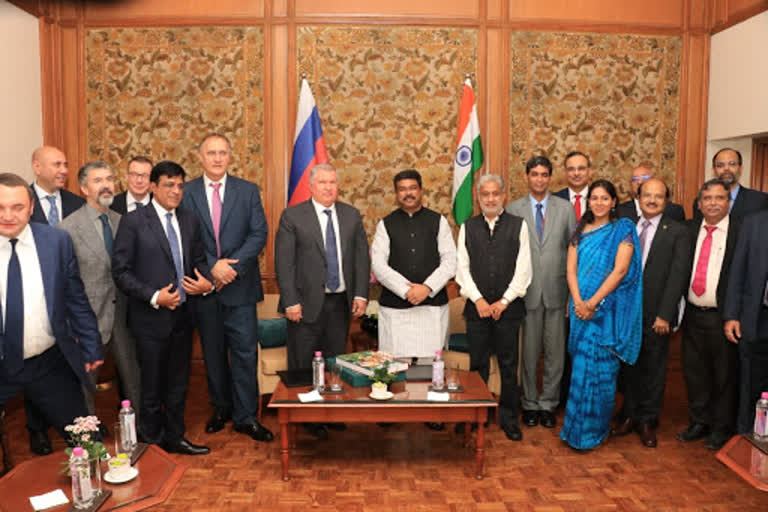New Delhi: India on Tuesday pitched for a stake in vast oil and gas fields as well as LNG terminals in the frozen Artic of Far East Russia as it looked to import more oil from the former Soviet republic as part of a strategy to diversify its energy basket.
Oil Minister Dharmendra Pradhan discussed investment opportunities when he met Igor Sechin, chief executive of Russian oil major Rosneft, here on Tuesday.
"We discussed elaborately for raising oil imports from Russia," he told reporters after the meeting.
India already imports a small quantity of oil from Russia but is looking to raise it through a new sea navigation channel between Vladivostok and Chennai. "We are confident, we will have some deal," he said.
During the meeting with Sechin, who Indians see as Mukesh Ambani of Russia, Pradhan renewed pitch for a consortium of Indian companies led by ONGC Videsh (OVL) taking about 49 per cent stake in Russia's Vankor cluster oilfields.
India had expressed deep interest in oil and gas exploration in Russian Far east during Prime Minister Narendra Modi's visit to Vladivostok earlier this month and Sechin's visit was a follow up of that, officials said.
During that visit, Indian firms H-Energy and Petronet LNG had signed agreements to buy liquefied natural gas (LNG) from Russian gas producer Novatek on long-term contracts as also a possibility of picking up stake in its LNG export projects in the Arctic.
But a deal for the Vankor Cluster couldn't be signed during the visit.
Read more:Jio tops download, Vodafone upload speed in August: TRAI
Indian firms have been in dialogue with Russia since 2017 for a possible stake in the oilfields that will consolidate their presence in the energy-rich Arctic region.
Mid-way through the negotiations, Rosneft had offered to club five more fields in the same region to the three that were already on the table, they said.
OVL, the overseas arm of state-owned Oil and Natural Gas Corp (ONGC), may hold 26 per cent stake in Suzunskoye, Tagulskoye and Lodochnoye fields -- collectively known as Vankor cluster, while Indian Oil Corp (IOC), Oil India Ltd and Bharat PetroResources Ltd (a unit of Bharat Petroleum Corp Ltd or BPCL) would hold another 23 per cent.
Rosneft, Russia's national oil company that owns the fields, wants to retain a majority stake and is keen to sell only up to 49.9 per cent stake.
Energy-hungry India is keen on sourcing one million barrels per day of oil and oil-equivalent gas from Russia and had identified Sakhalin-3 in the Far East, Vankor in East Siberia, and Terbs and Titov oilfields in Timan Pechora region as fields for potential collaboration. But for Vankor, it has so far not been successful in its attempts.
OVL already has 20 per cent stake in Sakhalin-1 oil and gas field in Far East Russia, and in 2009 acquired Imperial Energy, which has fields in Siberia for USD 2.1 billion.
Vankorneft, a subsidiary of Rosneft, is developing the Vankor oil and gas condensate field, situated in the northern part of Eastern Siberia.
In 2013, Vankorneft was chosen as an operator on development of new fields of Vankor cluster -- Suzunskoye, Tagulskoye and Lodochnoye fields, located close to the Vankor field.
The reserves of Suzunskoye field exceed 56 million tonnes of oil and condensate, and 35 billion cubic metres of gas.
In 2016, OVL first acquired 15 per cent stake in Russia's second-biggest oilfield of Vankor for USD 1.268 billion and then bought another 11 per cent for USD 930 million. The 26 per cent stake would give OVL 7.31 million tonnes of oil.
The consortium of OIL-IOC-BPRL acquired 23.9 per cent stake in the field at a cost of USD 2.02 billion, giving them 6.56 million tonnes of oil.
Rosneft continues to hold the remaining 50.1 per cent shares of JSC Vankorneft. The field has recoverable reserves of 2.5 billion barrels.
Besides, the OIL-IOC-BPRL consortium has taken another 29.9 per cent stake in a separate Taas-Yuryakh oilfield in East Siberia for USD 1.12 billion. The investments had taken the total outlay in Russia in that year to USD 5.46 billion.
These investments will give India 15.18 million tonnes of oil equivalent. The investment made compares to USD 28.48 billion investment by Indian oil and gas companies overseas in the past 50 years, giving it about 10 million tonnes of oil equivalent.
While Vankor produces about 4,42,000 barrels of oil per day (4 per cent of Russian crude oil production), Taas currently produces about 21,000 barrels per day of oil, and a peak of 1,00,000 bpd is expected by 2021.
